Overview of Rural Issues
Introduction to major regions, peoples, problems, and challenges of the rural United States, with an emphasis on groups and places in poverty and special emphasis on communities represented by RDLN Leaders. A look at the interrelationship of history, culture, socioeconomic factors, and choice of strategy for change. Identification of historical and contemporary trends in the rural U.S. Preparation for and reflection on Institute Field Trip. Identification of historical and contemporary trends in the rural U.S.
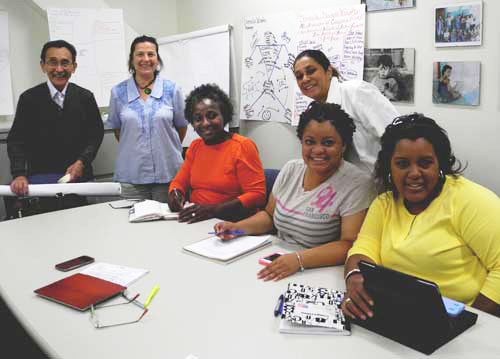 |
||
| Instructor Isao Fujimoto with (l to r) Mapy Alvarez, Dorothy Grady-Scarbrough, Oleta Garrett Fitzgerald, Maya Crooks, Darnella Burkett Winston. Isao Fujimoto graduated from Howard University and earned a PhD in Rural Sociology from Cornell. He helped found the community development program at UC Davis, the National Center for Appropriate Technology, the Davis Farmers Market, and many other pioneering organizations. He has been a key part of the RDLN Institute since its beginning in 1985 | ||
|
|
Tools for Rural Development
Introduction to skills, concepts and mechanisms useful for rural community development: library research, documents research, computer searches, community research and analysis, accessing data, use of statistics; review of programs, structures and technologies, with special sessions on organization and management (e.g. fundraising, board development), expository writing, internalized oppression, youth programs, and food and health policy.
|
Drama & Community Development - Public Speaking -Poetry
|
||
|
Writing for Advocacy and Development
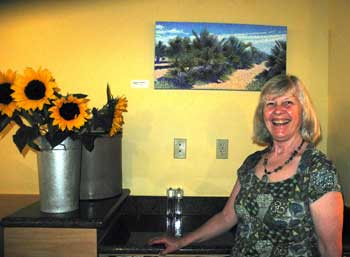 |
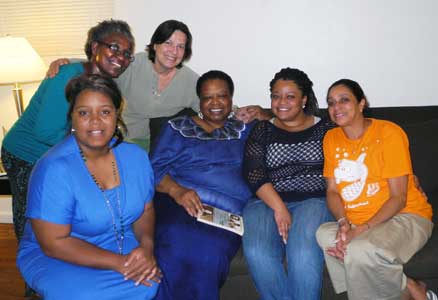 |
|
|
Instructor Margaret Eldred with with one of her paintings.
Dr. Margaret Eldred, formerly of the Campus Writing Center at UC Davis, is an artist and writer. The RDLN Leaders attended her art show in Davis. |
Instructor Billie Jean Young (center) surrounded by (l to r) Darnella Winston, Dorothy Grady-Scarbrough, Mapy Alvarez, Maya Crooks, and Oleta Fitzgerald. Billie Jean Young, J.D., a poet, organizer, and MacArthur Fellow, is former Chair of RDLN’s Board of Directors. She is Artist-in-Residence at Judson College in Marian, Alabama, where she teaches Drama and writes and directs plays related to local Civil Rights history.
|
| Entrepreneurship | Internalized Oppression | ||
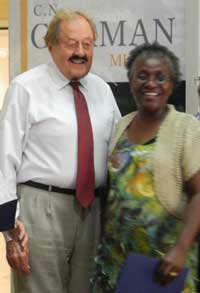
|
Instructor G. David Singleton was retired from the state of California American Indian Heritage Commission. He was a founder of the Native Entrepreneur Opportunity Fund and a trainer in Entrepreneurship with the California Indian Manpower Consortium. He had worked on economic development with many Indian tribes in California and was a CAP director and Civil Rights activist in Alabama in the sixties. He had presented webinars on Entrpreneurship for RDLN, including a series in partnership with RDLN and the Housing Assistance Council (HAC) this year. He also presented a session on Native American history for the Institute participants. |
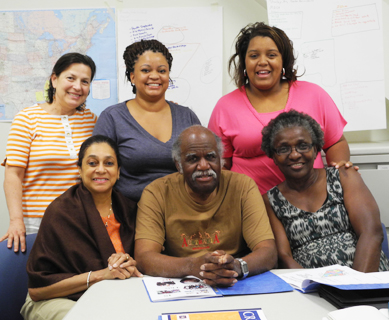 |
|
| Dave Singleton and Dorothy Grady-Scarbrough |
|
Instructor Jack Guillebeaux (center) surrounded by (l to r) Mapy Alvarez,Oleta Fitzgerald, Maya Crooks, Darnella Winston and Dorothy Grady-Scarbrough |
Economics and Economic Development: Macro-Economics
Introduction to basic economic concepts and methodology. Examination of determinants of economic growth and development. Opportunity to develop analytical skills in regard to problems of economic development in rural areas, including an understanding of alternative institutional systems and structures for the production and distribution of goods and services. Investigation of how alternative institutional structures influence the quality of life in rural areas.
Overview of financial markets, institutions and instruments, including the Federal Reserve system. Introduction to specific applications such as cost/benefit analysis of rural development projects and analysis to tax impact and to such functions as financial intermediation and financial leveraging.
Discussion of specific economic development efforts in some depth through case studies, including examples from communities where RDLN students live and work.
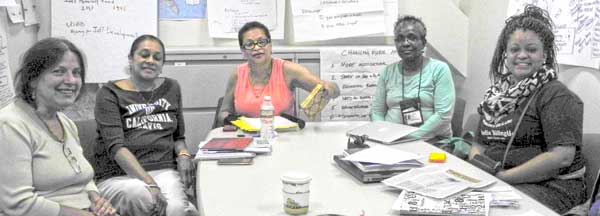 |
||
| Instructor Julianne Malveaux (c) with Mapy Alvarez, Oleta Fitzgerald, Dorothy Grady-Scarbrough, and Maya Crooks. Julianne Malveaux is a syndicated columnist, and Director of Economics Education in Washington DC, Dr. Malveaux is past president of Bennett College in Greensboro, NC | ||
Our Economies, Our Cultures: Micro-Economics
Review of structures of community development organizations; the process of setting institutional goals and objectives; review of alternative strategies for coordinating the accomplishment of goals and objectives; alternative means of budgeting and cash flow analysis; overseeing work flow; matching organizational structure to the type and size of the enterprise.
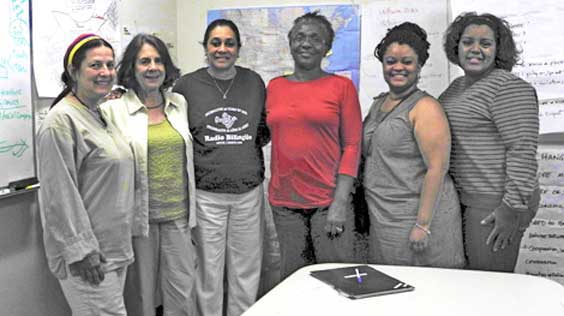 |
||
| Instructor Maria Varela (second from left) with Group XII Leaders. Maria Varela is a graduate of the National Rural Fellows program, a MacArther Fellow, and a veteran of the civil rights movement and the land rights movement in the Southwest. She founded Ganados del Valle, an economic development organization, Tierra Wools, where local women make and sell weavings, and Pastores General Store, which had coffee for visitors and animal supplies. | ||